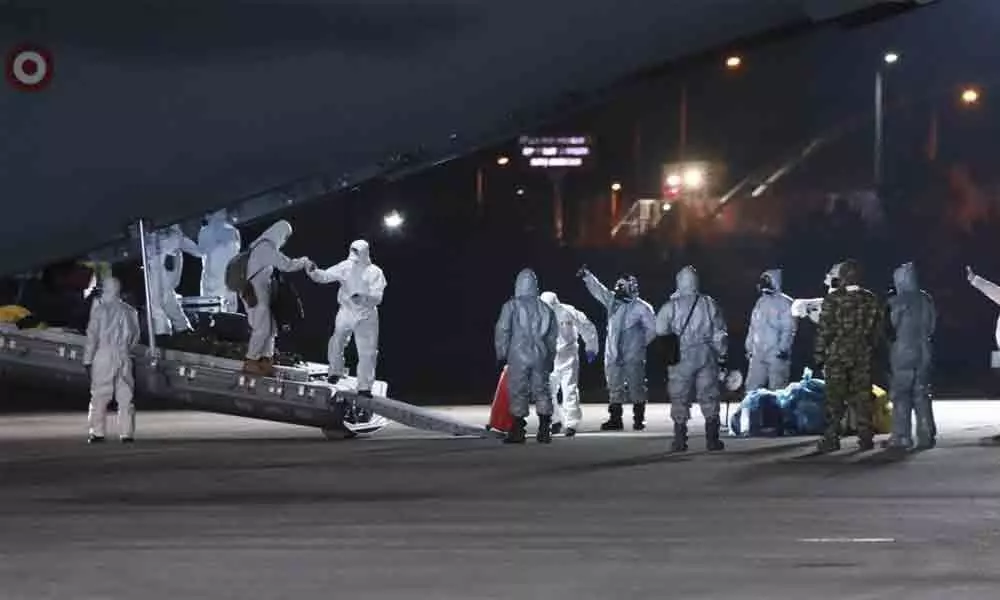Coronavirus: Perils of economic integration

The coronavirus has led to a shutdown of the Chinese economy. Airbus has suspended the production of airplanes and Foxconn, which makes mobile phones for Apple, has done the same for mobile phones.
The coronavirus has led to a shutdown of the Chinese economy. Airbus has suspended the production of airplanes and Foxconn, which makes mobile phones for Apple, has done the same for mobile phones. The Chinese share markets are down and are pulling the global markets with them. Tourists - to and from China - have come to zero.
We are also impacted. Fourteen percent of our imports, including items such as auto parts, come from China; and five percent of our exports of items such as diamonds, fish, spices and rubber go to China. The throttling of imports of auto parts may lead to a cut in automobile production, and non-availability of raw chemicals may lead to a cut in production of pharmaceuticals in our country. Our exporters will also be impacted. Our growth rate is likely to come under pressure.
Clearly the virus has impacted those sectors of our economy that are deeply integrated with global trade. Our automobile production would not be impacted if, for example, we had been manufacturing the auto parts ourselves. However, the pursuit of cheap raw materials has led us into deeper global integration where domestic alternatives were available. The virus leads us to reexamine the benefits and cost of global integration.
Let us consider the example of a farmer.
A farmer has to decide the level at which he integrates his economy with the city. He can bring tractor on rent, buy seeds and insecticides, bring labour from the street corner labour market, and the mechanic for the repair of his bore well. Such a farmer may be able to produce goods cheaper because these inputs may be cheaper in the city. However, this deep integration can cause equally severe problems for him if the road is damaged, there is some agitation in the city, or there is spread of a disease.
He will not be able to obtain insecticides immediately and his crop may wilt. His crop would be saved had he relied on homemade insecticides. In other words, there are two contradictory impacts of the integration of his economy with the city. The cost of production reduces with deeper integration but, at the same time, the risk also increases with deeper integration.
There is an "optimum" level of integration that balances between the two impacts. The benefits from integration are more and the increase in risk is less at the initial levels of integration. For example, bringing hybrid seeds from the city may give more benefits and have less risk. The benefits from integration are less and the increase in risk is more at higher levels of integration.
For example, dependence of labour from the city can cause loss if the workers go to their hometown during the festivals. The farmer should not integrate beyond the point where the increase in benefits is less and the increase in risk is more.
Similarly, there is an optimum level of integration for the economy. For example, importing phosphate fertilizers or frontier technologies may give more benefits and have less risk. However, importing auto parts can put our economy at avoidable risk if there is a war or an outbreak of a disease such as happening with the coronavirus at present.
It was possible to manufacture these parts domestically, but we started to import them for small benefits in cost and put our economy in peril. The economy should not be integrated beyond the point where the increase in benefits is less and the increase in risk is more.
The situation of Multinational Companies is fundamentally different. It is beneficial for them to have maximum integration because they often have alternatives available to them.
For example, Foxconn can produce the Apple phones in its factories in, Malaysia, Czech Republic, South Korea, Singapore or the Philippines while China is in a shutdown. An Indian pharmaceutical manufacturer, however, does not have such an option leading to a loss for the Indian economy.
There is a divergence of interests between the MNCs and our economy. It is beneficial for the MNCs to have the maximum integration with the global economy while it is beneficial for the domestic economy to have only the optimum level of integration with the global economy. Integration beyond the optimum level is beneficial for the MNCs but harmful for the domestic economy. The government must identify this optimum level and restrict integration at that level.
The second learning from the viruses like HIV-AIDS, SARS and coronavirus is rooted in the human processes that lead to their development. These viruses, and many more, have been present in the nature since times immemorial.
These take the form of an epidemic when they jump from animal hosts to human beings; followed by mutation and multiplication in the human body — somewhat akin to the lion wanting to kill after tasting blood. The need is to prevent the jump from animals to humans. The example of HIV is illustrative here. A study by Amit Chitnis and others has suggested that HIV "may have emerged epidemically as a result of harsh conditions, forced labor, displacement, and unsafe injection and vaccination practices associated with colonialism" in French Equatorial Africa.
Another study by Sousa and others found that the "colonial authorities recruited men to work in railways, fluvial and seaports, and other infrastructure projects, and most of these men did not bring their wives with them.
Then, the highly male-biased sex ratio favoured prostitution, which in its turn caused an explosion of sexually transmitted diseases that provided the base for HIV-AIDS to develop. The learning is that the displacement of the tribal populations from their natural environment led to an increase in tension, a corresponding decrease in the immune resistance and to the development of the HIV virus. The virus that was present but not harmful in nature, entered the human body and became an epidemic.
This pattern seems to have led to the development of the SARS epidemic in the Guangdong Province of China. This province is considered to be the economic powerhouse of China. The same pattern appears to have repeated in Wuhan where the coronavirus has developed. It must be noted that the Chinese economy is bullish because it allows destruction of the environment freely.
In other words, rapid economic development that places human beings in an unnatural environment appears to have contributed to the development of these viruses.
We must, therefore, think whether we should eschew global integration beyond a level; and whether we must slow down our pursuit of economic growth to levels that do not place people in an unnatural environment and puts excessive stress that appears to have led to the viruses such as HIV-AIDS, SARS and corona to assume epidemic levels..
(The writer is formerly Professor of Economics at IIM, Bengaluru)








